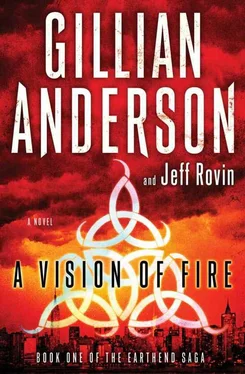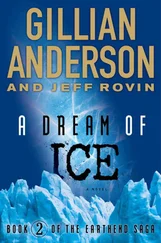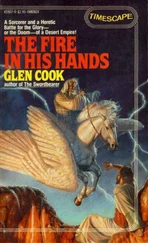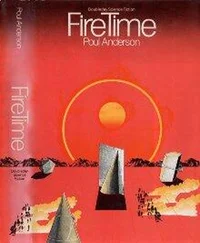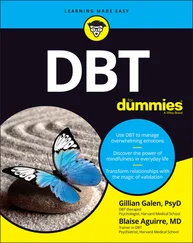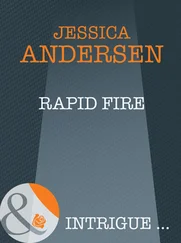“Do they speak English?”
He nodded.
And then they were back within earshot, loading up the white four-door Land Cruiser Aaron had borrowed. Enock Capois immediately claimed the front seat, leaving Caitlin to sit with his mother in the back. Caitlin stopped herself from smiling. An assumption of hierarchy seemed almost quaint, but there was something preferable about sitting with the madame anyway.
With Aaron driving, the truck began the long climb up the hills outside of Pétion-Ville. Route 101 led south away from Port-au-Prince. It was a decently paved two-lane road lined with cobblestone gutters, sometimes concrete walls. Dark and brilliant greenery tumbled over the latter, backed by palm trees and a cloudless blue sky that seemed as flat and taut as a drum. But less than ten minutes later they began to see occasional pedestrians walking along the side of the road, carrying plastic jugs, plastic bags, bundled blue tarps, and car tires. If there was a universal sign of poverty, it was this: adults and children on the march, recycling, reusing, repurposing items that could barely buy them a single meal.
The mother and son seemed disinclined to talk and Caitlin decided there could be no harm in asking Aaron about Gaelle’s episode in the market. That was, after all, why she had come.
Aaron recounted the incredible story—drowning on dry land, CPR, coughing up nothing—without editorializing. He had decided not to judge and Caitlin appreciated that.
“Gaelle mentioned that she had a CAT scan?” she said.
“Yes.”
“I was surprised to hear one was so readily available.”
“I snuck her in,” Aaron said bluntly. “We usually need the machine Saturday nights or on Sundays. Gangs smash the solar-panel streetlights on weekends so they can operate in the dark, so all the blunt-force head trauma tends to happen then.”
Madame Langlois spoke up: “People are angry.”
Caitlin regarded her. “Which people?”
“All. You know the name of the market where the video was made? Croix-des-Bossales.”
“The Slave Market,” Aaron translated.
“We keep the name to remind us. Someone always wants to be the new master.”
Her son reached up and turned Aaron’s rearview mirror so that he could look at Caitlin without turning his head.
“You are a psychiatrist?” he asked. His accent was thicker than his mother’s but his English was just as polished.
“Yes.”
“I have been to college too,” he said. “Do you teach people that they should not fear the world?”
“In a way. I help them to see that—”
“Is that what you are going to say to this young woman of Haiti?”
“I won’t know until I—”
“Nature conspires against Haiti,” he said. “World governments conspire against us. Our past conspires against us. She has a dark life ahead of her.”
Caitlin heard Aaron mutter, “He’s got a point.”
“Is that why she’s so agitated?” Caitlin asked. She glanced at the man’s mother. “Has someone or some thing chosen her to express Haiti’s pain?”
She had kept the question broad, hoping that they would narrow the focus. Aaron seemed to tense; the “something” reference opened the door to gods and demons, the personifications of centuries of fear.
Enock did not take the bait. He just sucked his teeth. Aaron kept his eyes on the twisting road and pedestrians.
The madame broke the short silence. “I heard Dr. Basher treated knife wounds from the Group Zero fight two nights ago.”
Enock suddenly lost all interest in Caitlin. He pelted Aaron with questions about the victims, who apparently included some of his friends. Aaron gently restored his rearview mirror to its position as he answered that the wounds were not life-threatening, and gave Caitlin a warning look.
While Enock processed the information about his friends, the madame looked out the side window.
“Do you know that Vodou is currently illegal in Haiti?” she asked, clearly to Caitlin, though she was not looking at her.
“I thought it was protected in the constitution.”
“The new constitution last year did not include this protection.”
“I’m sorry. Religious freedom should not be optional.”
“We have been attacked for dancing, for our rites. There have been stonings of Vodou priestesses.”
“I didn’t know.”
“So you understand, with pressure descending upon us, we are… cautious.”
Caitlin nodded once, twice. The woman was not apologizing, simply explaining her reserve.
“We are also proud,” the madame added.
“I understand, and my concern for Gaelle is genuine,” Caitlin replied. “Genuine and without judgment.”
“But you do not believe in demons,” she said.
“I don’t believe in labels,” Caitlin replied.
The madame nodded and stared out the window again. There were fewer houses along the road now, and most of them were shacks. The rounded mountaintops, deforested over the past century, looked bare and hungry.
“May I ask,” Caitlin said, thinking back to what Gaelle said and choosing her words carefully, “if you believe in spirits?”
The madame did not answer. Aaron’s wary look in the mirror told her that was a yes.
Caitlin pressed on respectfully.
“What do you see when you look out there? Does it just look like a landscape to you, or is there more?”
The madame reached into her bag, pulled out a cigar, lit it, and smoked for a while. She said, “In Africa, elephants hear the footfalls of other elephants hundreds of miles away. They carry a map of the land in their minds far beyond anything we have. Pigeons, too. Plenty of other birds, other animals.”
“Subsonic communication,” Caitlin said, merging the worlds of science and magic.
The madame smoked. “Humans have this too. We don’t use it.”
“Do you?”
Aaron frowned at Caitlin.
“I see only my tired country,” the madame said. “Only that.”
A silence stretched into quiet. Caitlin allowed the motion of the car among the hills to lull her into a reflective state— Observe and let go, tide in, tide out —but she was hoping that somehow answers, or at least the right questions, would rise from these depths. The torment of Maanik and now Gaelle was never far away.
Just over an hour later they crested a hill and saw the Caribbean sparkling below them. The southern coast, dotted with beaches, was like a flute channeling Haiti’s tired breaths, sweetening the sound. Fortunately and unfortunately, the beaches were being discovered by foreign investors. Jacmel already had several resort communities, including one that was painted aggressively white. Caitlin was sure the planners had thought of it as bright and cheerful, but to a people who built mostly with gray concrete, the paint was an insult. Yet tourists brought money for meals and education. The Anglade Charter Fishing office was tucked behind the slim, New Orleans–style columns of a pale green house. It would not have existed without the vacationers. Nor would Gaelle’s education as a nurse.
The door to the office was open and Caitlin, first in, watched Gaelle stand up behind her desk as the little group strode in. The first thing Caitlin noticed was the slightly sunken look around Gaelle’s hazel eyes. This young woman had not been sleeping well. Otherwise, her hair had been freshly braided and pulled up into a chignon, and she was wearing a pale yellow blouse. Everything about her and the office was tidy, tucked in, as neatly organized as a nurse’s station in a hospital. And Gaelle’s manner was purposeful, just shy of abrupt.
The young woman did not seem overly pleased to see Dr. Basher or the Vodou family, but she greeted them courteously and shook hands. A surprisingly tall, strong middle-aged woman with a creased face and worried eyes appeared from a back room. She had an air of reticence that had grown over her formidable physicality like a vine on a wall. Gaelle introduced her as her stepmother, Marie-Jeanne, and she was cordial to the madame and her son, slightly less so with the Americans. Caitlin quickly asked to sit alone with Gaelle in the small garden in the back. Marie-Jeanne agreed to mind the office for a few minutes and Aaron took the madame and her son around the corner for coffee. They went willingly, the madame giving a shrug as if to say, Free coffee is free coffee .
Читать дальше
